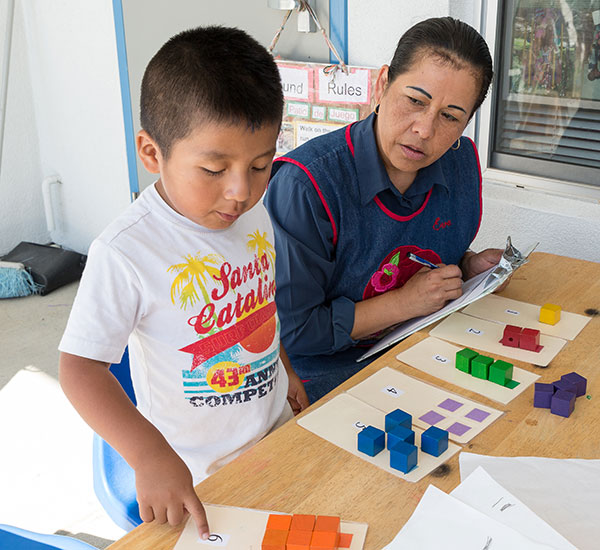 Introduction
Introduction
Ongoing assessment is a process used to measure and document how children grow, develop, and learn. It's important to make sure the assessment tool is valid, reliable, culturally and linguistically appropriate, and made for ongoing assessment.
The purpose of ongoing assessment is to:
- Identify each child's unique strengths and needs
- Inform planning to meet children's needs
- Offer parents and families practical information about their child's development
- Measure each child's progress toward individual and program school readiness goals
- Gather information to improve child outcomes
- Find resources to support each child and their family
Strategies
Ongoing assessment begins the day a child is enrolled in a program. The program continues assessing the child through their entire time in the program. Features of ongoing assessment include:
- Using a child assessment tool
- Observing and identifying children's knowledge and skills
- Gathering information from parents and family
- Conducting informal observations
- Interpreting data to improve teaching practices in group care settings and home visiting strategies in home-based programs
Implementing ongoing assessment involves these five steps:
- Planning
Plan ahead of time to make sure that your assessment is accurate and reliable:- Consider what information to collect
- Identify who will collect the data and when
- Decide how to gather and store it
- Establish how to share information with others
- Gathering Data
Teachers, home visitors, and family child care providers gather information from different people, like other staff or therapists who know the child. Parents are also encouraged to share information about their child's growth and development. - Interpreting Data
Teachers, home visitors, and family child care providers receive training on how to use the program's assessment tool—learning to accurately interpret and examine the data they gather to see what it tells them. - Using and Sharing Data
Teachers, home visitors, and family child care providers use the data to adjust their teaching practices or home visiting strategies to support each child's current and next levels of development. - Providing Program Support
Administrators help teachers, home visitors, and family child care providers gather and use child assessment information when they provide time and training dedicated to assessment. They can reflect on the data with staff and work with them to make sense of the information they collected.
 Staff Training
Staff Training
Teachers, home visitors, and family child care providers gather child assessment information. It is important for them to have the necessary training and support to perform the work, including:
- Knowledge of child development
- Knowledge of and ability to implement various methods for gathering data
- Best practices for effectively engaging parents in the assessment process in group care and home-based settings
- Best practices for assessing young dual language learners
- Family and cultural contexts that affect language acquisition and all other learning
- Knowledge of best practices for assessing children with disabilities, children who are suspected of having a delay, and children who are identified as having a delay but are not eligible for services under the Individuals with Disabilities Education Act (IDEA)
- Best practices for assessing children in home-based programs
- Training on how to properly use the assessment tool selected by the program
Head Start Program Performance Standards
Child screenings and assessments, 45 CFR §1302.33:
- (b)(1)–(3) Assessment for individualization
- (c)(1)–(4) Characteristics of screenings and assessments
- (d) Prohibitions on use of screening and assessment data
Parent and family engagement in education and child development services, 45 CFR §1302.34:
- (b)(6) Teachers inform parents about the purposes of and the results from…assessments…
Education in home-based programs, 45 CFR §1302.35:
- (f) Screening and assessments
Resources
Child Observation: The Heart of Individualizing Responsive Care for Infants and Toddlers
Standards in Action: Assessment for Individualization
When Health Affects Assessment
« Go to Head Start Tip Sheets for Grantee Planning
Read more:
Resource Type: Article
National Centers: Early Childhood Development, Teaching and Learning
Last Updated: July 25, 2023
